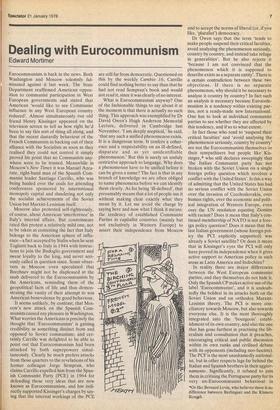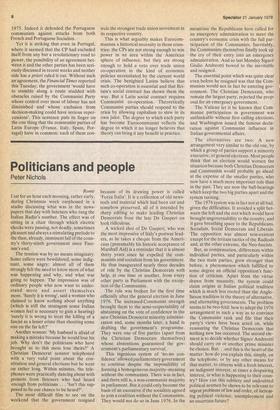Dealing with Eurocommunism
Edward Mortimer
Eurocommunism is back in the news. Both Washington and Moscow solemnly fulminated against it last week. The State Department reaffirmed American opposition to communist participation in West European governments and stated that American 'would like to see Communist influence in any West European country reduced'. Almost simultaneously our old friend Henry Kissinger appeared on the television screen to tell us how right he'd been to say this sort of thing all along, and that the recent dastardly behaviour of the French Communists in backing out of their alliance with the Socialists as soon as they realised they could not control it simply proved his point that no Communists anywhere were to be trusted. Meanwhile in Moscow's New Times it was Manuel Azcarate, right-hand man of the Spanish Communist leader Santiago Carrillo, whb was being hauled over the coals for attending conferences sponsored by international monopoly capital and slandering not only the socialist achievements of the Soviet Union but Marxist-Leninism itself.
Moscow also protested self-righteously, of course, about American 'interference' in Italy's internal affairs. But connoisseurs rated this protest a relatively mild one, not to be taken as contesting the fact that Italy belongs to the American sphere of influence — a fact accepted by Stalin when he sent Togliatti back to Italy in 1944 with instructions to join the Badoglio government and swear loyalty to the king, and never seriously called in question since. Some observers in Moscow even speculated that Brezhnev might not be displeased at the snub delivered to the Eurocommunists by the Americans, reminding them of the geopolitical facts of life and thus demonstrating the vanity of their attempt to win American benevolence by good behaviour.
It seems unlikely, by contrast, that Moscow's new attack on the Spanish Communists caused any pleasure in Washington. What worries the Americans is precisely the thought that 'Eurocommunism' is gaining credibility as something distinct from and opposed to Soviet communism; and certainly Carrillo was delighted to be able to point out that Eurocommunism had been attacked by both superpowers simul taneously. Clearly he much prefers attacks from those quarters to the revelations of his former colleague Jorge Semprun, who claims Carrillo expelled him from the Span ish Communist Party (PCE) in 1964 for defending those very ideas that are now known as Eurocommunism, and has indirectly supported Kissinger's charges by saying that the internal workings of the PCE
are still far from democratic. Questioned on this by the weekly Cambio 16, Carrillo could find nothing better to say than that he had not read Semprun's book and would not read it, since it was clearly of no interest.
What is Eurocommunism anyway? One of the fashionable things to say about it at the moment is that there is actually no such thing. This approach was exemplified by Dr David Owen's Hugh Anderson Memorial Lecture, delivered in Cambridge last November. 'I am deeply sceptical,' he said, 'that any such a unified phenomenon exists. It is a dangerous term. It confers a coherence and a respectability on an ill-defined, disparate and as yet unidentifiable phenomenon.' But this is surely an unduly restrictive approach to language. Why does a phenomenon have to be unified before it can be given a name? The fact is that in any branch of knowledge we are often obliged to name phenomena before we can identify them clearly. As for being 'ill-defined', that presumably means that a lot of people use it without making clear exactly what they mean by it. Let me avoid the charge by saying here and now what I think it means: the tendency of established Communist Parties in capitalist countries (mainly but not exclusively in Western Europe) to assert their independence from Moscow and to accept the norms of liberal (or, if you like, 'pluralist') democracy.
Dr Owen says that the term 'tends to make people suspend their critical faculties, avoid analysing the phenomenon seriously, country by country, and instead take refuge in generalities'. But he also rejects it 'because I am not convinced that the phenomenon which it is supposed to describe exists as a separate entity'. There is a certain contradiction between these two objections. If there is no separate phenomenon, why should it be necessary to analyse it country by country? In fact such an analysis is necessary because Eurocommunism is a tendency within existing par ties, not a ready-made new International. One has to look at individual communist parties to see whether they are affected by this tendency, and if so to what extent.
In fact those who tend to 'suspend their critical faculties' and 'avoid analysing the phenomenon seriously, country by country' are not the Eurocommunists themselves or their sympathisers but people like Kis singer,* who still declares sweepingly that 'the Italian Communist party has not broken with the Soviet Union on a single foreign policy question which involves a conflict with the United States'. Is this a way of admitting that the United States has had no serious conflict with the Soviet Union over the invasion of Czechoslovakia, over human rights, over the economic and political integration of Western Europe, even over the UN resolution equating Zionism with racism? Does it mean that Italy's continued membership of NATO is not a foreign policy question? Does it mean that the last Italian government (whose foreign policy the PCI explicitly supported) was already a Soviet satellite? Or does it mean that in Kissinger's eyes the PCI will only have proved its independence when it gives active support to American policy in such areas as Latin America and Indochina?
In reality there are major differences between the West European communist parties, and they themselves do not hide it. Only the Spanish CP makes active use of the label 'Eurocommunisf, and it is undoubtedly the boldest in its attacks both on the Soviet Union and on orthodox MarxistLeninist theory. The PCI is more conciliatory towards Moscow, but also towards everyone else. It is the most thoroughly integrated into the 'bourgeois' establishment of its own country, and also the one that has gone furthest in practising the liberalism and consultation that it preaches, encouraging critical and public discussion within its own ranks and civilised debate with its opponents (including neo-fascists). The PCF is the most unashamedly nationalist, but in other respects lags far behind the Italian and Spanish brothers in their aggiornamento. Significantly, it refused to join them in critising the Portuguese party for its very un-Eurocommunist behaviour in *Or like Bernard Levin, who believes there is no difference between Berlinguer and the Khmers Rouget.
1975. Indeed it defended the Portuguese communists against attacks from both French and Portuguese Socialists.
Yet it is striking that even in Portugal, where it seemed that the CP had excluded itself from any but a revolutionary road to power, the possibility of an agreement between it and the other parties has been seriously discussed in recent weeks and neither side has a priori ruled it out. Without such an agreement, the Financial Times reported this Tuesday, the government `would have to stumble along a route studded with obstacles raised by the Communist Party whose control over most of labour has not diminished and whose exclusion from decision-making could have serious repercussions'. This sentence puts its finger on the one thing that the communist parties of Latin Europe (France, Italy, Spain, Portugal) have in common: each of them con
trols the strongest trade union moverhent in its respective country.
This is what arguably makes Eurocommunism a historical necessity in those countries: the CPs are not strong enough to win power in an area within the American sphere of influence, but they are strong enough to hold a veto over trade union co-operation in the kind of economic policies necessitated by the current world crisis. The benighted Latins believe that such co-operation is essential and that Britain's social contract has shown them the way. But a Latin social contract requires Communist co-operation. Theoretically Communist parties should respond to the crisis by allowing capitalism to stew in its own juice. The degree to which each party has become Eurocommunist reflects the degree to which it no longer believes that theory can bring it any benefit in practice.



































 Previous page
Previous page